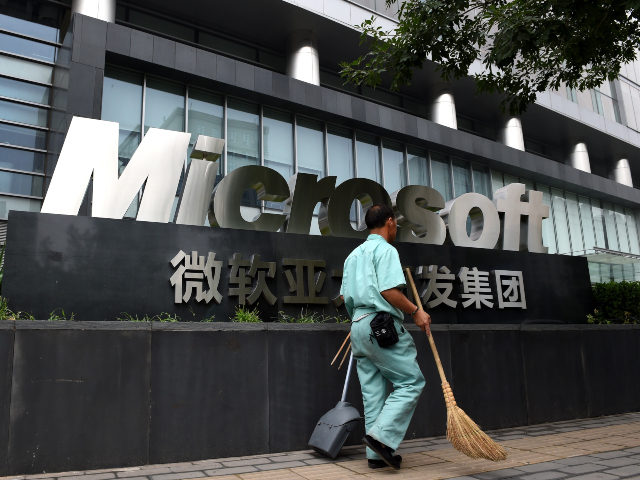Cooperation with China has become a major point of criticism for Silicon Valley companies, most notably Google, which was excoriated by both Democrats and Republicans for trying to build a censored search engine called “Project Dragonfly,” for the Chinese market last year. But there’s another tech company that has far deeper ties to China — Microsoft.
It’s easy to ignore Microsoft, sometimes seen as a has-been company, often portrayed as a company that was exciting in the 1990s, but now plays second fiddle to the Silicon Valley Masters of the Universe at Google, Facebook, and Apple.
That portrayal is a mistake. By a long shot, Microsoft Windows is still the market-dominant operating system worldwide. It owns Skype, LinkedIn, and Xbox. Through Microsoft Azure, it owns a sizeable chunk of the cloud computing market, giving it influence over the flow of online information. And it is still the world’s most valuable company.
It also has taken steps into politics and news. Through its partnership with NewsGuard, it sought to influence the news site choices of its Mobile Edge browser users.
More boldly, Microsoft hopes to be the guarantor of election integrity in the United States — it is developing software called “ElectionGuard,” which it hopes will be used in ballot booths around the United States. The first ElectionGuard systems will go into action in 2020.
Which makes it perplexing that Microsoft is so friendly to China, the United States’ most dangerous global rival.
Did you know that Bing, Microsoft’s search engine, is active in China and censors itself to keep the ruling regime happy? Try searching for terms like “Dalai Lama” and “Falun Gong” on Bing’s Chinese search engine — you can’t. This is, of course, precisely the sort of thing that threw Google into turmoil over “Project Dragonfly” last year. But it didn’t attract nearly as much attention, because, well, it’s Bing.
And then there’s Microsoft-owned LinkedIn, the social network for professionals. More prominent social networks like Facebook and Twitter have largely abandoned attempts to access the Chinese market, aware that it’s a political hot potato.
But not LinkedIn. Unlike other western social networks, it is not banned in China, and has 41 million users in the country. And, as you’d expect, it censors its Chinese users heavily to enjoy that privilege. Interestingly enough, China also likes to use LinkedIn to recruit spies in America. Two birds with one stone!
Just a few days ago, the CEO of Microsoft’s China division, Alain Crozier, gave an interview to CNBC in which he touted the company’s services to help “Chinese companies do business abroad,” which is one of his division’s “biggest streams of activity.” He spoke of how there are “even more opportunities” in the Chinese market than before.
Perhaps anticipating concerns around his company’s work in the region, Crozier also mentioned principles around “transparency and security and protection” that govern the company’s AI work in China.
This seems like a very specific area of concern — until you realize that Microsoft’s AI division is working with a Chinese military university. The work includes matters related to facial recognition.
Working with China’s military is also something that got Google in trouble — earlier this year, the top military officer in the U.S, the Chairman of the Joint Chiefs, slammed Google for “directly benefiting” the Chinese military.
In another interview last year, Crozier made some more admissions that sound even more startling today — for example, that the viral Chinese-owned app TikTok — which is reportedly facing a national security review by U.S. officials — was hatched in Microsoft’s China-based Research & Development facility.
Crozier also boasted that Microsoft’s China-based R&D center is the largest one outside the United States. The interview occurred in November 2018 — as Google’s Project Dragonfly scandal was in full swing.
It’s not illegal to do business in China, of course. And Microsoft’s links to the country go back a long way.
But if that’s the route it wants to take, it might want to think twice about its aspirations to run America’s voting systems.
Microsoft has yet to return Breitbart News’ request for comment.
Are you an insider at Google, Facebook, Twitter or any other tech company who wants to confidentially reveal wrongdoing or political bias at your company? Reach out to Allum Bokhari at his secure email address allumbokhari@protonmail.com.
Allum Bokhari is the senior technology correspondent at Breitbart News.

COMMENTS
Please let us know if you're having issues with commenting.